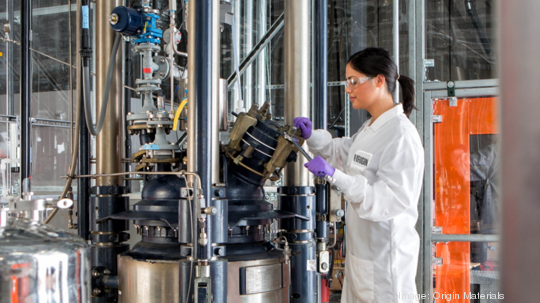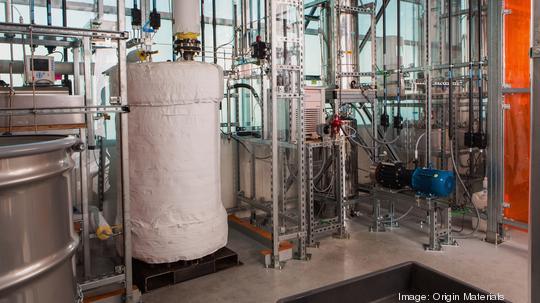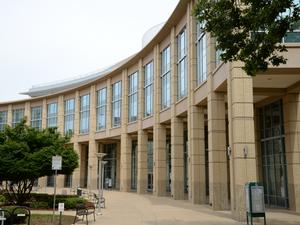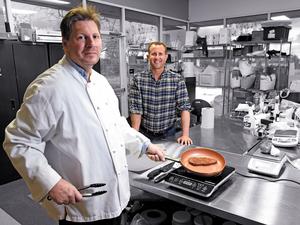Sacramento’s clean technology industry is on a roll, pulling in more than $1.7 billion in funding from global investors in recent months.
The Sacramento region has long been a hub for promising clean tech companies, but the significant amounts of funding flowing in could presage growing clout and employment.
Those companies include West Sacramento chemical and green technology company Origin Materials. It announced in February that it’s going public through a nearly $1 billion merger with Artius Acquisition Inc., a New York-based publicly traded special purpose acquisition company, or SPAC.
SPACs are companies with no operations, that are formed only to raise capital through an initial public offering to acquire or merge with another company.

Origin Materials’ funding is notable not only because it’s the region’s first SPAC deal, but also because if the company raises its estimated $925 million, it would become the region’s largest publicly traded company by market capitalization.
Roseville residential solar and efficiency lending company Loanpal announced in January that it received $800 million from Bay Area investors to fund growth.
And at the end of January, Sacramento company Infinium received an investment of an undisclosed amount from Amazon, Mitsubishi Heavy Industries Ltd. and others to bring technology to market to make net-zero carbon transportation fuel from electricity.
There have been smaller fundings as well. Folsom groundwater management company Aquaoso raised $2 million, and Wind Harvest International raised more than $1 million since the new year for its near-ground wind turbine technology.
In December, Roseville solar photovoltaic company Sunworks Inc. raised $34 million in a stock offering to pay down debt and fund growth.
Davis-based Sierra Energy raised $33 million two years ago from Breakthrough Energy Ventures, a fund that includes investors Jeff Bezos, Bill Gates, Richard Branson and Mark Zuckerberg. Sierra Energy is developing systems around its FastOx gasification technology, which turns municipal garbage into clean energy.
Waves of interest
None of these were overnight successes, said Gary Simon, chairman of CleanStart, a nonprofit that connects and supports clean technology companies in NorthernCalifornia.
“Most of these companies have been at it for 10 years. They have established themselves. They have proven revenue and proven customers. They made it across the threshold of being a good idea to being a good investment,” Simon said.
Interest in clean tech seems to come in waves. In the early 2000s and again in the early 2010s, investors were seeking out investments in clean tech or green tech companies, Simon said. But investors discovered that these businesses require large up-front investment, and the payoff may be many years in the making. So for long stretches of time, clean tech wasn’t sexy for venture investors,Simon said.
The advancement of clean tech companies isn’t happening everywhere. Sacramento has these companies because it’s supported the clean tech community for years, Simon said.

Origin Materials’ deal “is a huge recognition of what Origin did,” Simon said. “They have been methodical all along in getting to where they are now.”
But investors are coming into clean tech now in a big way, Simon said. “They weren’t there for this sector for many years.”
Dan Morash, founder and CEO of Sacramento-based CSS, formerly known as California Safe Soil, agrees that the investment pipeline for clean tech was largely turned off for many years. CSS was founded in 2012 to make organic liquid fertilizer for crops from expired supermarket food.
“There is clearly enormous interest now in dealing with environmental issues, and it comes at a time when there is a flood of liquidity in the market,” he said.
Companies like Origin Materials are benefiting, as investors are showing particular interest in lower-risk ventures that already have viable products and willing customers.
It is difficult to get a startup to that point, Morash said.
“None of this is easy. The technology can be challenging, and even making it work can be difficult,” he said.
The story of Gold River-based CleanWorld is an example of that. It started up in 2009 to commercialize anaerobic digesters that converted organic waste from municipal garbage into electricity. It built a digester plant at University of California Davis, but ended up selling the plant to the university in 2016. CleanWorld has since shut down.
CSS is now working with UC Davis to collect ammonia that CleanWorld’s former plant produces, and which CCS can use for its products.
“Some of these technologies have high upfront costs,” Morash said. And even once in operation, they are difficult to run if, like in the case of CleanWorld, they have inconsistent feedstocks. Some days the waste its former plant receives could be food, and other days it could be trimmings, grass or paper products that require it to operate differently.
Opportunity in climate goals
Investors’ renewed interest in clean tech is driven in part by government mandates and private companies’ voluntary efforts to fight climate change.
California in recent years has adopted some of the most aggressive climate goals in the country.
In 2018, the Legislature passed Senate Bill 100, which mandates that California use renewable resources to supply 100% of its electricity by the end of 2045. In 2019, the California Energy Commission mandated that all new single-family residential units starting in 2020 must be powered by renewable energy. And last year, Gov. Gavin Newsom signed an executive order that mandates that all new passenger cars and trucks sold be zero-emission vehicles by 2035.
This will help California to lead in development of clean technology, said Barry Broome, CEO of the Greater Sacramento Economic Council. And Sacramento’s lower cost of living may give it an advantage in clean technology development over other regions of California.
“We are a world-class science community,” Broome said, adding that scientists can afford to buy a home in Sacramento, which isn’t so much the case in the Bay Area or coastal Southern California.
Some of the biggest investments in clean tech now are being made by giant corporations that are trying to operate more sustainably.
Origin Materials, which makes recyclable plastic without using fossil fuel, has been working with partners including Nestle SA, Danone SA and PepsiCo Inc.

Infinium got its investment from Amazon and Mitsubishi Heavy Industries, among others. Infinium is commercializing a process that uses renewable electricity to release hydrogen from water, and then mixes the hydrogen with waste carbon dioxide to make synthetic gas.
Companies like those that invested in Infinium are under increasing pressure from their own investors and regulators to address climate change.
Larry Fink, the CEO of New York-based BlackRock Inc., the world’s largest asset manager, has been telling investor conferences for several years that companies need to assess climate risk and include plans to address it.
BlackRock previously had been asking for sustainability strategies in the companies it holds in its portfolio.
Fink upped the stakes this year in his open letter to global CEOs.
“We know that climate risk is investment risk. But we also believe the climate transition presents a historic investment opportunity,” Fink said in the letter.
“We are asking companies to disclose a plan for how their business model will be compatible with a net zero economy — that is, one where global warming is limited to well below 2ºC, consistent with a global aspiration of net zero greenhouse gas emissions by 2050,” Fink wrote. “We are asking you to disclose how this plan is incorporated into your long-term strategy and reviewed by your board of directors.”
In 2010, the Securities and Exchange Commission began requiring publicly traded companies to disclose climate-related risks in their corporate filings.
In February of this year, the SEC’s Interim Acting Chair Allison Herren Lee said the commission will be enhancing its focus on climate-related disclosure in public company filings as they apply to climate change matters.
California, as is often the case, is considering a corporate disclosure requirement on climate change that would go beyond federal requirements.
In January, State Sen. Scott Wiener (D-San Francisco) introduced the Climate Corporate Accountability Act, which would require all companies doing business in California with gross annual revenue of more than $1 billion to disclose their greenhouse gas emissions and set science-based targets reducing them. The Senate Environmental Quality Committee is scheduled to hold a hearing on the bill April 12.
In addition to public and private sustainability goals, clean tech ventures may also benefit from an abundance of investment capital looking for assets with good returns.
“I’m not surprised,” said Mark Rawson, chief operating officer of the California Mobility Center, a Sacramento effort to assist in prototyping for electric transportation and future vehicle technology. “What we are hearing is that there is a lot of money that was tied up on the sidelines because of the pandemic that is now looking for places to put that money to use."
Local companies
Here’s a look at some Sacramento-area clean-tech companies:
Aquaoso Technologies PBC
Based: Folsom
Founded: 2016
Employees: 12
Origin Materials
Based: West Sacramento
Founded: 2008
Employees: 40
Loanpal
Based: Roseville
Founded: 2018
Employees: 1,000
Infinium Holdings/Greyrock Energy
Based: Sacramento
Founded: 2006
Employees: 20
Sierra Energy
Based: Davis
Founded: 2004
Employees: Not disclosed









